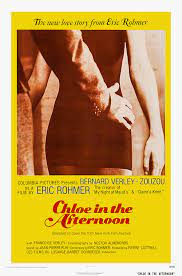Articles/Essays – Volume 08, No. 2
Moral Tales for Our Times | Eric Rohmer, dir., Chloe in the Afternoon
Chloe is the last and one of the most evocative of Eric Rohmer’s “Six Moral Tales.” The previous stories include La Collectioneuse, My Night at Maud’s, Clair’s Knee, and two shorter works for television.
These films, in contrast to the standard action movie, portray internal moral conflict involving decision more than action and verbal more than physical ex pression; they are literate and philosophical. Rohmer’s stories are usually about a man who has made a decision to be true to one woman being tempted by another. The character then struggles with a moral choice which becomes more and more intense.
In Chloe, a happily married man is shown in a comfortable, somewhat uneventful existence. His wife teaches school and the evenings are spent quietly; he reads while she corrects papers. The duration of silence, brief smiles and small talk is punctuated by the ticking of a clock. He plays affectionately with his children in the morning before going to the office where things seem pretty much under control: two attractive secretaries, a few phone calls and ample time to walk about Paris in the afternoon.
Strolling after lunch in the afternoon is tempting but harmless. It is a time for introspection, for reflection upon his relationship with women, defining his sense of maleness. He catches the eye of one striking Parisienne after another—but only for a moment. In a literate ambiance he narrates his thoughts to us—how stunning each passing woman is, how he is reminded of past days when he might pursue and win the affections of such women. Now, he assures himself, he is satisfied with a glance, sufficient to indicate that there might be a mutual attraction. He tells himself, perhaps trying to convince himself, that these fleeting moments of eye contact along the avenue only serve to remind him of how much he loves his wife. Further, they make him love her more.
Enter Chloe, previous lover who unexpectedly reasserts herself in his life, showing up at his office and eventually accompanying him on his walks in the afternoon. He finds an interest in Chloe somewhat akin to the brief visual engagements with the various anonymous females he sees on his walks. But he has known Chloe, she knows him, and she is there repeatedly, persistently. At one point while visiting Chloe at a dress shop where she is temporarily working, he watches her change clothes. She is strong willed and invites him to make love to her. He is tempted but resists.
The story is subtle and the tension builds casually. Boy meets girl, but a lot happens before he does or doesn’t get her. The involvement is internal, a test of will. The presumption of an underlying moral commitment creates tension which would not exist in an amoral story where attraction to a woman would find easy resolution.
Without understanding the protagonist’s moral commitment, and perhaps im patient with the internal, cerebral “action” that takes place as he faces a conflict between his loyalty to his wife and the continuous beckoning of Chloe’s body, some viewers have interpreted his resisting temptation as a lack of decisiveness or masculinity. His reaction to Chloe is certainly atypical in contemporary society. He shows restraint even though he finds Chloe appealingly tempting. Because he delays his decision until the last possible moment, his decision is made more difficult—and the movie more entertaining.
Chloe carries a vivid message for those who presume a moral dimension in their lives.
Chloe in the Afternoon, a film by Eric Rohmer.


 Back to full Issue
Back to full Issue

